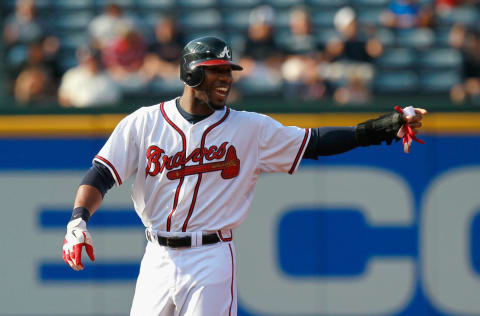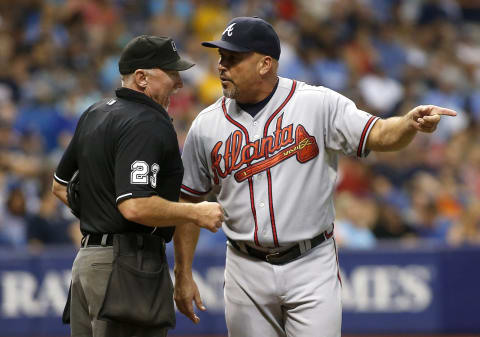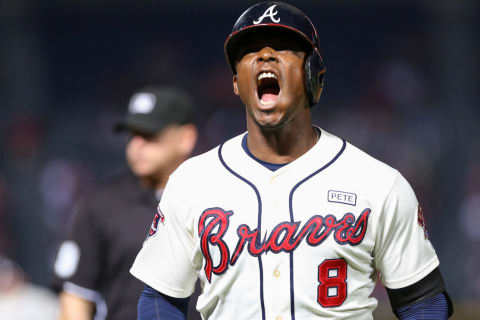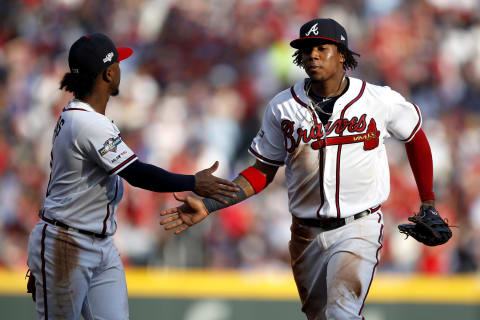A reflection on the last decade of Atlanta Braves baseball


Given where this Atlanta Braves franchise was heading as we began the 2010 season, no one could have predicted the tortured twists and turns that have happened since.
It’s not hard to see the 2010’s as a decade of transition for the Atlanta Braves. We had recently seen the retirement of three (now) Hall of Fame pitchers; a HOF manager and third baseman would follow shortly thereafter.
But transitions don’t always follow the script that we might have hoped for, and thus as 2020 dawns, this team looks altogether different from what it probably should have looked like by now.
Entering 2010, Atlanta not only had the long streak of 14 division titles broken – that came in 2006 – but the Braves had not even reached the playoffs for 4 years… finishing 3rd or 4th in the division each time and struggling to breach the .500 mark.
But things would be different to begin this decade.
Beginning with a Bang
2010 itself began in a big way with a game that pretty much gave fans hope that things would turn on a dime… though it was a crazy-memorable first inning that did so.
Rarely can you point to a single game or single event as setting a tone for what was to come, but this is one of those times.
April 5th, 2010. 1st game of the year and the home opener for Atlanta against the Cubs at Turner Field. The starter for the Braves was Derek Lowe and he wasn’t fooling anyone.
Flyout that nearly left the yard. Liner single. A walk. Another deep flyout gave hope that he could get out of the jam. A second pitch home run that proved he couldn’t. Finally, a groundout to end it.
3-0 Cubs on just 18 pitches.
But then the Braves got a shot at Carlos Zambrano… walk to Melky Cabrera (yeah, he was on the team that year). Single by Martin Prado. Single by Chipper Jones. Single by Brian McCann. 4 batters in, 1 run scored and nobody’s out.
Troy Glaus made that first out via a 3 pitch K. Yunel Escobar then singled home Prado and Jones. The game is tied.
That brought up the most anticipated rookie hitter since Chipper Jones himself over a decade and a half earlier: newly-minted right fielder Jason Heyward.
He spit on 2 pitches for a 2-0 count. The third pitch was near the bottom of the zone, but over the middle of the plate. He didn’t miss it and the ball landed in the back of the Braves bullpen in right-center, capping a 6-run response by the home team.
That homer still ranks as one of the longest – and almost certainly the longest – that Heyward has ever hit in the majors. Depending on whose measurement you believe, it traveled somewhere between 446 and 471 feet. The reactions in the stands were incredible. It was like a bomb of pure glee had gone off.
The Braves went on to smother the Cubs 16-5 that day and launched off of this start to surge to a 91-71 record.
Heyward himself had a great season; the pitching staff – led by Lowe, Tim Hudson, Tommy Hanson, Jair Jurrjens, and collection of others (Mike Minor, Kris Medlen, Brandon Beachy among them) had a so-so year – with Hanson and Hudson leading the way.
All the while, there were some issues here and there. Melky’s attitude. Kenshin Kawakami‘s poor performance. Yunel Escobar’s bad bat, which led to his replacement.
Still, you could look at that clubs and project what might have been greatness coming:
- Freddie Freeman and Andrelton Simmons were both on the way.
- This was Billy Wagner‘s last season while he gave tutelage to Craig Kimbrel
- Jonny Venters and Eric O’Flaherty were to be the set-up men.
- Medlen, Beachy, Minor, Hanson, and Jurrjens looked like a promising and rising rotation
- Jones and Brian McCann were soon to depart, but it appeared that enough offense to replace them was there – or coming.
Atlanta lost in the division series to the eventual World Series champion Giants… the game where Buster Posey was clearly out (1:11:11 into this video… see 1:11:38 in particular)… before later scoring the lone run of the game in a Giants Game 1 win.
That series ended the career of manager Bobby Cox and started the changes to follow in earnest.

2011 and Beyond
It’s hard to follow a legend and yet the Braves now had an entire organization trying to do just that.
- Fredi Gonzalez followed Bobby Cox
- A cast of many followed Chipper Jones, Martin Prado perhaps being the most successful, though not getting a lot of time at third
- Atlanta ran through a bunch of successors to Brian McCann… finally culminating in McCann himself at the end of the decade.
- Every starter seemingly had to overcome the shadows of Maddux, Glavine, Smoltz, or Hudson
- Even in the front office, Frank Wren was given the impossible task of maintaining what John Schuerholz had done before him.
Still, it appeared early on that a handful of players might be those anchors to return the Braves to the post-season on a consistent basis: names like Heyward, Freeman, Uggla, and CF Jordan Schafer.
Alas, those wheels feel off fairly quickly. Schafer messed up a wrist shortly after his debut and and was never the same after that. Uggla had a shocking deterioration in the ability to see and hit the ball.
Jason Heyward rejected a chance to stick around in Atlanta for the long term and was traded to the Cardinals. Only Freddie Freeman was able to maintain both performance and a will to stay for the duration. He was ultimately the top performer of the decade for the Braves – and it wasn’t close.
The Unexpected Turns
General Manager Frank Wren’s attempts to keep Atlanta competitive ultimately decimated the farm system and – despite a 1st place finish in 2013 – still met with no success in the playoffs.
This last, best effort was the result of 2 significant deals: the signing of Melvin/B.J Upton and a trade to acquire brother Justin Upton.
That lineup also included Freeman, McCann, Uggla, Simmons, Heyward, and Chris Johnson – along with fan favorite Evan Gattis and a cast of lesser characters who looked promising. Yet virtually all (aside from Freeman and Johnson) under-performed for the year… and they still won 96 times.
Alas, that team collapsed in the playoffs again and the 2014 edition – featuring much of the same lineup – seemed to give up on the season, falling to a 79-83 record under Fredi Gonzalez.
The internal turmoil boiled over, and Wren lost the power struggle. He was relieved of his duties in mid-September that season.
John Hart took over with the clear direction that he was keeping the seat warm for up-and-comer John Coppolella. But this time also ushered in The Rebuild.

Growing Pains
Things didn’t get any better on the field as Hart and Coppolella started with multiple dramatic moves to reshape the direction of the club.
In 2015, the team posted a 67-95 record at what would be the nadir of the abyss. Shortly therafter, Hart declared that Coppolella’s apprenticeship was complete and kicked himself upstairs, naming Coppolella as the General Manager.
Even while the rebuild was still in full swing, Coppolella was demanding better results on the field. After a 9-28 start in 2016, he fired manager Fredi Gonzalez in a move that seemed to be a relief to almost everyone involved as it appeared the sword hanging over Gonzalez’ head had been following him for months.
That brought up AAA manager Brian Snitker to salvage the season as the interim field boss until season’s end.
A funny thing happened, though: the Braves were still bad, but rallied to a 59-65 mark under Snitker and the team – led by Freddie Freeman – lobbied for Snitker to be retained. The demands were ultimately honored and he’s been in the dugout ever since.
The Scandal
But there was much more going on under Coppolella’s watch. As it is, we’ll almost certainly never know the full extent of what went on or who was the most responsible for what happened.
What appears to have taken place, though, is that Coppolella and International scouting director Gordon Blakeley conspired together to go well beyond the normal pattern of behavior that teams had been exercising in the process of acquiring talent from Latin America and beyond.
Blakeley had been doing this for the Yankees while Coppolella was also on staff there, and the belief is that Coppolella armed Blakeley with a virtual blank check to do whatever was necessary to land as many players as he could during the 2016-2017 signing period.
In doing so, they ran afoul of some specific no-no’s that MLB had previously declared to be in place regarding the use of ‘packaging’ players to circumvent bonus rules.
Almost immediately after the Red Sox were caught doing this, the Braves implemented their own similar plan… and in stonewalling the subsequent investigation, Coppolella was not just fired, but also banned from baseball.
All of the players acquired as a result of the rule circumvention were decalred free agents – including Korean shortstop Ji-Hwan Bae, who was singled out not because of the $300,000 signing bonus he received but because of the $600K extra that he was to received under the table.
The penalties imposed ultimately have harmed future Braves’ teams greatly… perhaps resulting in a decade of damage between lost players, lost future international signings, reduced international spending, and lost presence in the scouting of international players.
Never mind the black mark on the franchise itself.

Re-Emergence
So the Atlanta Braves are now on their 3rd manager (Brian Snitker) and 4th general manager of the decade in Alex Anthopoulos. Normally, that kind of turnover is the sign of a terribly run organization… and for a couple of years… yes, it was.
Given the turmoil behind them, these newest choices – however they were made – have provided genuine stability in the organization… an the results are beginning to show with finishes of 3rd, 1st, and 1st in the past 3 years with two straight playoff berths.
True – the team has not yet broken through in the playoffs yet (and we’re now at 9 straight appearances without a series victory), but if trends continue it feels like that’s just a matter of time.
Also with the evident mistakes made by Wren and Coppolella, this club can still point to particular moves made by each GM that have shaped the state of the club today.
With some long-term extensions already on the books (Acuna, Albies) and others declared to be here for the duration (Freeman), the next decade looks much more predictable – so far – than the last.
Of course all of this is being said with the knowledge that the last transaction of this decade could be vital in determining the direction of the next 3-4 years of the franchise: and right now that decision is in the hands of Josh Donaldson.
Whether he signs back to Atlanta or a big trade is made to fill the hole he leaves – that will be an event of continued transition as we begin the 2020’s decade.
Next. The Aging of those at the Hot Corner. dark
Change is thus inevitable and prediction is but folly. But as always… Go Braves!